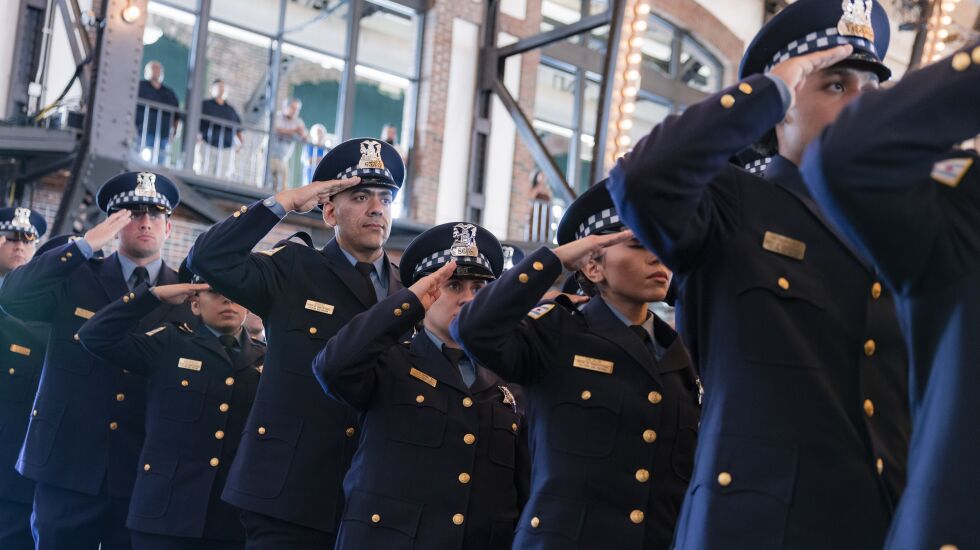
As the U.S. Justice Department works to negotiate consent decrees to establish federal oversight of dysfunctional law enforcement agencies in Minneapolis and Louisville, some point to the sluggish pace of reform in Chicago as a warning.
But consent decrees are not a panacea. Even the most powerful tool is only as useful as the public servants who wield them. Mayors, police officials, community leaders and — perhaps most importantly — federal authorities must be committed to their execution.
One of Attorney General Merrick Garland’s first acts in office was to rescind the Trump-era guidance that curtailed the use of consent decrees, declaring that “the Department will use all appropriate legal authorities to safeguard civil rights.”
President Joe Biden’s appointment of Kristen Clarke to oversee the Civil Rights Division demonstrated his administration’s staunch commitment to the whole-of-government equity agenda outlined in his first executive order.
It’s beyond misleading to compare a consent decree negotiated with and overseen by Garland’s department and Clarke’s division with agreements that were actively undermined by an administration determined to roll back civil rights protections at every level.
Transformation in New Orleans
Federal consent decrees were established by the Violent Crime Control and Law Enforcement Act of 1994, the same year I was elected mayor of New Orleans. I stepped in to lead a city whose police department was under federal investigation for corruption. Police officers were routinely extorting drug dealers. The city led the nation in police brutality complaints. Hours after my brand-new police superintendent was sworn in, a young mother who had filed a police brutality complaint was murdered on the orders of the officer she’d reported.
That new superintendent, Richard Pennington, and I devoted ourselves immediately to reforming the troubled department we inherited. Dozens of officers were forced to resign and several hundred more were disciplined. We enacted anti-corruption measures and created a Public Integrity Division. We raised our hiring standards and officer pay, instilling the department with a sense of professionalism and pride.
By the end of my first term, the New Orleans Police Department was “a force that chiefs in other cities looked to for inspiration.” We did it all while cutting the violent crime rate in half. And we did it without a consent decree.
But the strength of consent decrees is that they are not dependent on the leadership or good will of any particular mayor or chief of police. Had a consent decree been in place when I left office, my successor could not have so easily undone the reforms we put in place. In 2010, when Mitch Landrieu took office, he immediately asked the Justice Department to investigate the department’s pattern of civil rights violations, excessive force and other misconduct.
The 2012 consent decree, executed by Mayor Landrieu and overseen by Eric Holder’s DOJ under President Barack Obama, was an undeniable success. By the end of 2018, the New Orleans Police Department had made “significant progress in all areas of the Consent Decree” and “full and effective compliance” in several important areas.
Notably, federal monitors wrote, “the reforms NOPD has undertaken have not impaired the Department’s overall crime-fighting ability. Indeed, according to the New Orleans Advocate, in 2018, violent crime dropped to the lowest levels since 1970.”
Federal firepower in Chicago
By contrast, Chicago’s consent decree with the Illinois Attorney General — lacking the legal firepower of the federal government — was undermined and mischaracterized from the beginning by the Trump administration.
Initiated under the Obama administration after the fatal shooting of Laquan McDonald, a federal investigation found in 2016 that the Chicago Police Department had engaged in a pattern or practice of unreasonable force, particularly against Black and Latino residents. Investigators determined that the CPD failed to adequately train officers, provided insufficient support for officer safety, and failed to conduct meaningful investigations into police officers’ use of force.
In 2017, however, incoming Attorney General Jeff Sessions scuttled the DOJ’s plans for a consent decree. When the city instead worked with state authorities to draft a decree, Sessions intervened to block it, falsely claiming that “unjustified restrictions on proper policing” were responsible for a surge in violent crime.
Trump’s second Attorney General, Bill Barr, further hampered efforts at police reform, threatening communities that demand accountability for police misconduct that if they don’t “respect” law enforcement, “they might find themselves without the police protection they need.”
In 2019, U.S. District Judge Robert Dow finalized the consent decree between Chicago and the state and appointed an independent monitor to evaluate progress. Dow was succeeded in November 2022 by U.S. District Judge Rebecca Pallmeyer.
Chicago’s progress toward achieving the goals of its consent decree has indeed been slow, but Mayor Brandon Johnson now has allies, rather than adversaries, in the federal agency with the power to enforce civil rights protection.
If state, local, and federal officials can work hand in hand with community leaders, meaningful reform can become a reality.
Marc H. Morial is president and CEO of the National Urban League. He served as mayor of New Orleans from 1994 to 2002 and is a graduate of the University of Pennsylvania and the Georgetown University Law Center.
The Sun-Times welcomes letters to the editor and op-eds. See our guidelines.







